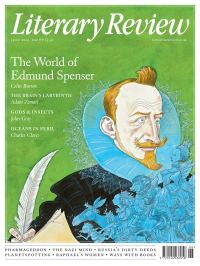Norman Stone
World on Fire
The Second World War
By Antony Beevor
Weidenfeld & Nicolson 863pp £25
In the early 1990s, the Frankfurter Allgemeine ran a questionnaire, apparently thought up by Proust, to divine the respondents’ character. One question was: ‘Which military achievement do you most admire?’ The limply correct answer, given by most Germans, was ‘none’. Isaiah Berlin wrote ‘the Battle of Britain’, an ingenious answer. During 1940, the general assumption was that the Nazis were militarily superior; some people thought that it would have made sense to find out what Hitler’s terms were. He had overthrown France in a few weeks – in a decisive afternoon, even, when his tanks crossed the River Meuse at Sedan. The British miraculously managed to lift 330,000 men from the trap at Dunkirk, but they left all their equipment behind. Why not at least enquire what Hitler had in mind?
Churchill resolutely refused, and the Cabinet, particularly its Labour element, supported him. A German threat of invasion developed, with the Luftwaffe preparing the way. At the time, it had roughly twice as many planes as the British, and though the superiority was less marked in terms of fighters, the German

Sign Up to our newsletter
Receive free articles, highlights from the archive, news, details of prizes, and much more.@Lit_Review
Follow Literary Review on Twitter
Twitter Feed
How to ruin a film - a short guide by @TWHodgkinson:
Thomas W Hodgkinson - There Was No Sorcerer
Thomas W Hodgkinson: There Was No Sorcerer - Box Office Poison: Hollywood’s Story in a Century of Flops by Tim Robey
literaryreview.co.uk
How to ruin a film - a short guide by @TWHodgkinson:
Thomas W Hodgkinson - There Was No Sorcerer
Thomas W Hodgkinson: There Was No Sorcerer - Box Office Poison: Hollywood’s Story in a Century of Flops by Tim Robey
literaryreview.co.uk
Give the gift that lasts all year with a subscription to Literary Review. Save up to 35% on the cover price when you visit us at https://literaryreview.co.uk/subscribe and enter the code 'XMAS24'